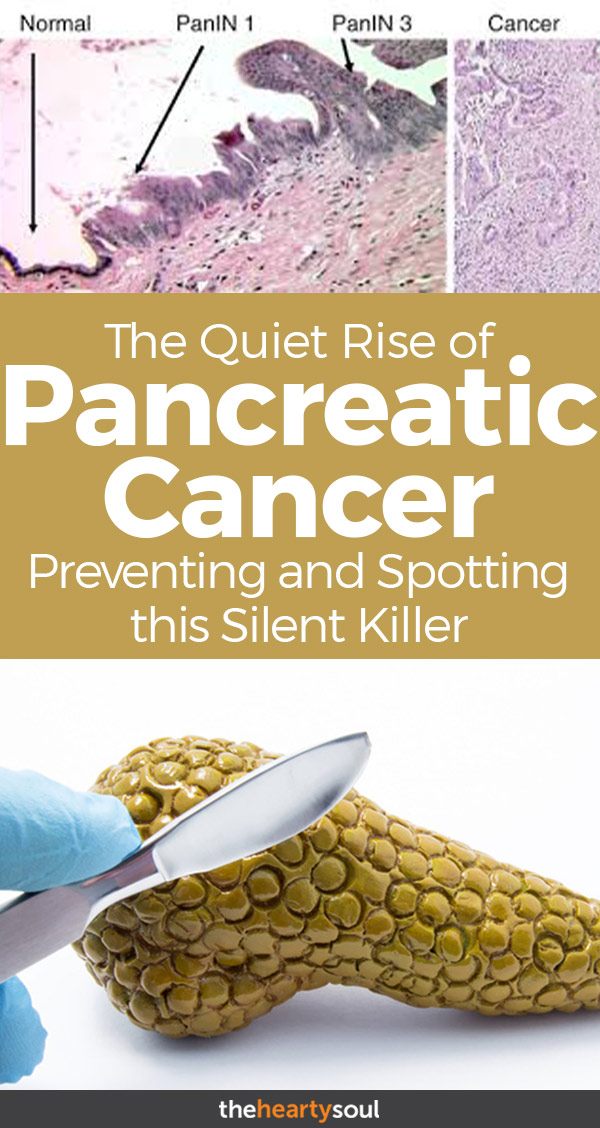Many of us likely don’t give much thought to our pancreas. What even is it, anyway? The pancreas has to do with the stomach—it’s vital to your digestion. The pancreas produces digestive enzymes and releases hormones (including insulin) to help control blood sugar [1].
Although pancreatic cancer isn’t extremely common (55,000 people are currently diagnosed every year), it’s one of the deadliest cancers because it has an uncanny ability to spread quietly [2]. We’ll take a closer look at pancreatic cancer to understand more about this secretive disease.
Why Is Pancreatic Cancer so Deadly?
Located in the abdomen, part of the pancreas is between the stomach and spine while the rest of it lies in the curve of the small intestine.
As a result of its discreet location, smaller tumors on the pancreas aren’t able to be felt and you might not experience symptoms until the tumor is big enough to affect its neighboring organs [3].
Since the majority of people aren’t diagnosed until the cancer has advanced, many people with pancreatic cancer will be dead within a year of diagnosis [4].
Another thing that makes this cancer so deadly is that most people won’t be eligible for surgery as treatment because the cancer will be too advanced, further cutting their chances of survival. Having surgery could increase the survival rate from 8% to 21% over a 5-year period.
Editor’s Note
A 2018 article from Scientific American purports that pancreatic cancer will soon overtake colon cancer for the second-leading cause of cancer in America. What’s more is that, when it comes to pancreatic cancer, over 75 percent of new patients are between 55-years-old and 85-years-old.
According to Robert A. Wolff, an oncologist who has been treating pancreatic cancer at the University of Texas MD Anderson Cancer Center for 20 years:
“Since I’ve been practicing, I’ve seen a shift from smoking to obesity as the driver,” he says. “An average patient of mine has a body mass index between 30 and 35 [obesity is defined as 30 or more], has diabetes or prediabetes, is hypertensive and takes a lipid-lowering agent.”
Because pancreatic cancer is one of the quickest to metastasize and hardest to treat, Wolff believes that prevention is the key. Somewhat sarcastically (but truthfully) he says:
“It’s thought that easily 30 percent of pancreatic cancer is preventable. Cutting back on obesity, better diets, more exercise, no smoking. What a concept!”
What Are the Early Signs of Pancreatic Cancer?
Unfortunately, there really are no “early” signs of pancreatic cancer; any of the following symptoms may be experienced as the result of another condition [5].
- Jaundice (yellow skin)
- Back pain
- Abdominal pain
- Weight loss
- Loss of appetite
- Nausea and vomiting
- Enlargement of the gallbladder or liver
- Diabetes
These symptoms may be indicative of another health problem or another cancer, so following up with your doctor is important to understand what’s really going on.
How Do You Get Pancreatic Cancer?
Although it’s difficult to nail down one specific cause of pancreatic cancer, there are numerous risk factors that can increase your chances of getting the disease. These include:
- Your risk for getting pancreatic cancer before age 50 is low, but after 50 it rises, with 72 being the average age of diagnosis.
- Smoking doubles your risk of pancreatic cancer and is one of the most preventable causes of many different types of cancer [7].
- Being overweight or obese increases your chances of getting pancreatic cancer by 20% and is again a preventable cause of the disease [8].
- Heavy alcohol consumption is a risk factor for pancreatic cancer, especially in men [9].
- Having a family history of pancreatic cancer may increase your risk for the disease [10].
Although you can’t control your age or genetic risk for pancreatic cancer, these other pancreatic cancer causes are entirely preventable.
How Can You Help Prevent Pancreatic Cancer?
By quitting smoking, minimizing alcohol consumption, and keeping your body at a healthy weight, you can not only reduce your risk for pancreatic cancer, but other cancers as well.
This includes exercising and eating a diet rich in organic fruits and vegetables in addition to protein, healthy fats, and other essential vitamins and minerals [11].
Unfortunately, there’s currently no standardized pancreatic cancer screening methods in place [12].
It’s always essential to be in tune with your body and recognize when something isn’t right. Getting an early diagnosis when it comes to diseases like cancer can save your life.
Conclusion
Pancreatic cancer, like many other cancers, can be preventable just by taking care of your body. Although it’s easy to trust your immune system to let you know when something is wrong, pancreatic cancer may not tell you it’s there until it’s too late. This is why taking care of yourself now in addition to knowing the warning signs is so important!
With that in mind, here are a few extra resources to help prevent and lower your risk of cancer.

Sources
- https://pathology.jhu.edu/pc/BasicOverview3.php?area=ba
- https://www.cancer.org/cancer/pancreatic-cancer/about/key-statistics.html
- https://pathology.jhu.edu/pc/basicoverview1.php?area=ba
- https://pancreatica.org/pancreatic-cancer/pancreatic-cancer-prognosis/
- https://www.cancer.org/cancer/pancreatic-cancer/detection-diagnosis-staging/signs-and-symptoms.html
- https://pathology.jhu.edu/pancreas/BasicRisk.php?area=ba
- https://www.cancer.org/cancer/pancreatic-cancer/causes-risks-prevention/risk-factors.html
- https://www.ncbi.nlm.nih.gov/pmc/articles/PMC2883092/
- https://www.cancer.net/cancer-types/familial-pancreatic-cancer
- https://www.lustgarten.org/get-informed/how-can-pancreatic-cancer-be-prevented
- https://www.cancer.org/cancer/pancreatic-cancer/detection-diagnosis-staging/detection.html
- Rahib L, Smith B, Aizenberg R, et al. Projecting Cancer Incidence and Deaths to 2030: The Unexpected Burden of Thyroid, Liver, and Pancreas Cancers in the United States. Cancer Research. 2014.

